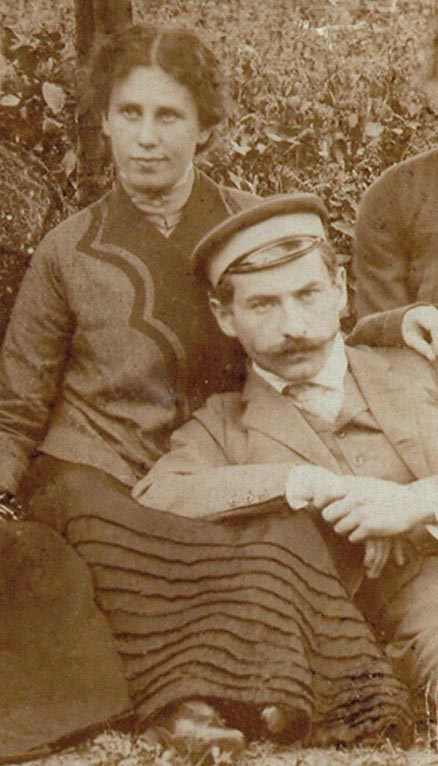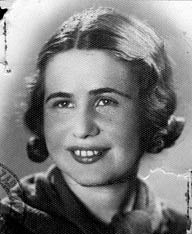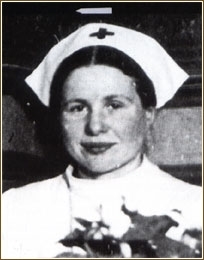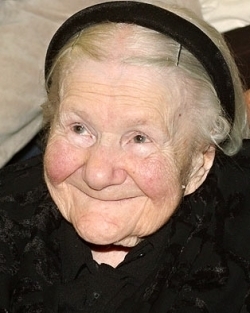 |
| Irena's parents |
"Heroes do extraordinary things. What I did was not an extraordinary thing. It was normal." Quoted from Irena Sendler, a woman who saved over 2,500 Jewish children and aiding their parents inside the walls of the Warsaw Ghetto during the Holocaust. Irena Sendler exemplifies a true hero. Born February 15th, 1910, in Warsaw, Poland to Dr. Stanislaw and Janina Sendler, she moved to Otwock and spent her childhood there. Being an only child, she set out to make friends, almost all of them coincidentally being Jewish. Her parents, humanitarians, always helped the poor. Irena grew to be a respectable young woman, graduating from Warsaw University and becoming a social worker. Then, in 1939, a terrible war began on Jews in Germany. Known as one of the worst mass-genocides ever recorded, the Holocaust took the lives of over 5.9 million innocent Jews. The Nazis invaded Poland and trapped Jews in ghettos where they would await shipment to death camps. The largest ghetto was the Warsaw Ghetto, housing over 380,000 people. This ghetto, was the one that Irena Sendler made her mark upon. She began by forging a fake ID claiming her to be a nurse so she could gain greater access to the Ghetto. Next, using secret passageways below the city, she would locate children and bring them to the outside with her. From there, she gave them all new identities, and sent them off to non-Jewish homes willing to take in the children. Sometimes, Sendler would carry children in a burlap sack on her back, or hide them in the back of her truck. Once, it was reported that Sendler hid infants in her toolbox and had a dog that barked to cover up the sounds of crying children. According to Arthur Ashe, "true heroism is remarkably sober, very un-dramatic. It is not the urge to surpass all others at whatever cost, but the urge to serve others at whatever cost." Sendler was humble, courageous, and had strong morals, making her an incredible hero.
 |
| Young Irena |
Irena Sendler's humble nature refused to let her take the glory for what she had done. When told of her status as a hero, Sendler was taken aback. She seemed almost insulted, telling Kate Connolly from the London Guardian; "The term 'hero' irritates me greatly....The opposite is true. I continue to have pangs of conscience that I did so little" ("Irena Sendler"). Elaine Woo reported Irena saying, "Every child saved with my help is the justification of my existence on this Earth," she said, "and not a title to glory" (Woo). Irena wasn't fazed by helping the Jewish children; she continuously mentioned that she felt she should have done more, and the guilt she should have aided more children was a constant reminder. Irena risked her life to save over 2,500 Jews, most of them children, from inside the walls of the Warsaw Ghetto in Poland, during the reign of the Nazis. Despite the fact, that a Polish Roman-Catholic girl like herself would have been left alone. Sendler could have easily turned the other cheek and go on with her life, but what makes her a hero is the fact that she did not. When the girls who wrote 'Life in a Jar' met Sendler, Irena expressed her immense gratitude and thankfulness. "My emotion is being shadowed by the fact that no one from the circle of my faithful coworkers, who constantly risked their lives, could live long enough to enjoy all the honors that now are falling upon me.... I can't find the words to thank you, my dear girls.... Before the day you have written the play 'Life in a Jar' -- nobody in my own country and few in the whole world knew about my person and my work during the war" ("Life in a Jar: The Irena Sendler Project"). Sendler's humble disposition did not let her be completely happy, because her friends and co-operatives at the Polish Council Aid to Jews (codenamed Zegota), did not live to share the spotlight with her. Sendler expressed her gratefulness, for what the girls had done in her honor, and her friends' honor. Irena mentioned she had always had their help, "I did not do it alone." Also claiming she wouldn't have been able to get anywhere without the 25 or so other people working with her, and that they deserved as much, if not more, credit than her. She was determined not to let their actions and contributions be overlooked in the shadows of her newfound fame and glory. Irena Sendler inspired people because she did not rescue the 2,500 innocent Jews because it would make her a hero. She saved them because she believed it was the right thing to do.
 |
| 'Nurse' Irena |
Sendler was often faced with difficult situations every day. She would have to tell parents the truth that, all though she could not guarantee their children would survive outside of the ghetto, she could promise that the children would die if they did not leave. She needed greater access to the Ghetto, and to be allowed deeper inside, "[Sendler] began to carry forged papers that listed her occupation as nurse, which gave her increased access to the Ghetto. This proved especially true when a typhoid fever outbreak occurred and few Germans wished to venture inside to provide aid; instead, they were happy to let [the Polish] do the dangerous work" ("Sendler, Irena"). The Kansas schoolgirls who personally met Irena described her in an interesting way; "Irena wasn't even 5 feet tall, but she walked into the Warsaw ghetto daily and faced certain death if she was caught. Her strength and courage showed us we can stand up for what we believe in, as well" (Woo). Sendler immediately requested permission to get into the Ghetto to provide much needed medical aid to the Jews inside. Her forged papers claimed her to be a Polish nurse, and she would wear a yellow star sew into all of her clothes, so as to blend in better, and state whose side she was really on. Irena didn't bat an eye when she walked past the Nazis, with a 5 year old boy concealed in the burlap sack on her back. Sendler had nerves of steel, and she swallowed her fears so she could do what she had set out to do. As a result, over 2,500 children were able to lead somewhat normal lives in peace, never having to face the horror of gas chambers and death camps, and they were able to grow older and tell the story of the courageous Polish woman who risked her life to save theirs. On October 20th, 1943, the Gestapo (or the Nazi Secret Police) raided Sendler's house, looking for her and the jar of names. "..She was captured by the Nazis and tortured but refused to tell her captors who her co-conspirators were or where the bottles were buried..." "When Sendler worked in the prison laundry, she and her co-workers made holes in the German soldiers' underwear. When the officers discovered what they had done, they lined up all the women and shot every other one" (Woo). Sendler, despite being held captive and awaiting execution, still continued to fight the Nazis. Making holes in the soldiers' underwear might not seem like a brig deal, but it basically the equivalent of pulling an angry tiger's tail. Irena refused to give out any information regarding Zegota, despite the Nazis repeatedly beating her, breaking her legs and feet. Sendler escaped only when fellow operatives paid off one of the guards driving Irena to the execution site. Sendler had been willing to give up her life for the children and adults and her friends at Zegota. She went so far as to spit in the faces of her captors, and never flinched at the punishments. On the outside, Sendler did not seem like the type to taunt the Nazis, and most find it amazing that such a sweet, caring woman could face such horrors and come out stronger on the other side.
Irena was raised in an open-minded household. Her parents were Roman-Catholics who had found friendship amongst Jews, who were often berated for being so poor. They raised Irena on the idea of always helping someone in need, regardless of where they came from, or what religion they practiced. "I was taught that if you see a person drowning, you must jump into the water to save them, whether you can swim or not" (Woo). "When you know that something is basically at stake, like real life, you do everything to save it. You don't talk about it and discuss it. You do it" ("Sendler, Irena"). Sendler believed her lack of amazement was just part of who she was; not thinking her heroics were anything special, simply what she believed was wrong and what was right. When WWII came around, Irena was furious and decided she owed it to the people to help them in their time of Irena's father was probably the greatest influence of all to Irena, despite his death when she was still a young girl. He taught her the idea of helping those in need, being a doctor who treated the poorest of Jews when they were sick. "She was especially influenced by her father, a doctor who defied anti-Semites by treating sick Jews during outbreaks of typhoid fever. He died of the disease when Sendler was 9" (Woo). She also has said; "I grew up among these people. All my life, I had Jewish friends." She then added; "My family taught me that what matters is whether people are honest or dishonest, not what religion they belong to" (Paldiel). Irena's father was a great man for what he was doing during that time period. He taught her to be courageous and fight for the rights of people who need them. Though he didn't live to see the horrors of WWII, his daughter took his teachings and saved over 2,500 Jewish lives. This is proof of how morally strong Irena was, because anybody else would have cracked under the pressure, given up when they were captured, or not have found the strength to keep going when the entire world seemed to be against them. Nobody but Irena Sendler could have possibly stayed true to their beliefs, and save so many innocent lives.
 |
| Irena Sendler |
Sendler was humble, courageous, and her morals were strong,
yet nobody noticed for at least sixty years. An old saying argues that if a
tree falls in the forest, but nobody was around to hear it, did it make a
noise? Irena Sendler was that tree that fell in the forest when nobody was
around. Now, people are only just beginning to notice the echoes of what her
heroic efforts truly did, and even continue to do, she inspires people
everywhere to be more humble, more courageous, and always staying true to their
morals. Irena Sendler, a Holocaust heroine, passed away on May 12th,
2008. She was living in Warsaw, Poland with her children. Despite having left
this world four years ago, what Irena Sendler did for all of those innocent
children will never be forgotten. The sound of her tree falling in the forest
was what started her journey to becoming a true hero; but what got her there
was her humbleness, her courage, and her morals.
"Irena Sendler." Encyclopedia
of World Biography. Vol. 28. Detroit: Gale, 2008. Gale Biography
In Context. Web. 2 May 2012.
"Life in a Jar: The Irena Sendler Project." Life in a Jar: The Irena Sendler Project.
Life in a Jar: The Irena Sendler
Project, 2006. Web. 03 May 2012
Paldiel, Mordecai. "Irena Sendler." Encyclopaedia Judaica. Ed. Michael Berenbaum and Fred Skolnik. 2nd ed. Detroit: Macmillan
Reference USA, 2007. Gale Biography In
Context. Web. 8 May 2012.
"Sendler, Irena." Encyclopedia
of World Biography. 2nd ed. Vol. 28. Detroit: Gale, 2008. 318- 320. Gale
Virtual Reference Library. Web. 2 May 2012.
Woo, Elaine. "WWII Savior of Young Jews." Los Angeles Times. Los Angeles Times, 13 May 2008. Web. 08 May 2012.
Page created on 5/23/2012 12:00:00 AM
Last edited 5/23/2012 12:00:00 AM
